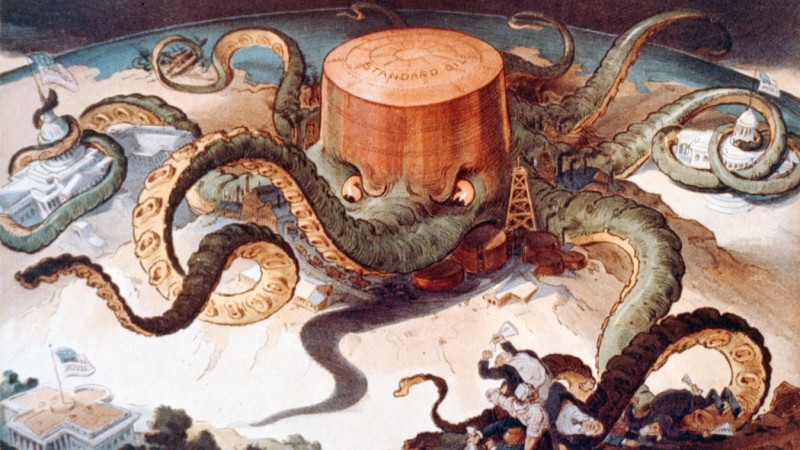
Critics fear that the two transatlantic trade agreements are designed to help big business circumvent important regulations. Similar concerns were behind this 1904 political cartoon showing a Standard Oil tank as an octopus overriding democracy. Published by Ottmann Lith, Co., 1904 Sept. 7. Now Creative Commons.
Citizens all over Europe are petitioning against CETA (the Comprehensive Economic and Trade Agreement) and TTIP (The Transatlantic Trade and Investment Partnership). According to the European Comission, CETA “will offer EU firms more and better business opportunities in Canada and support jobs in Europe”, while TTIP “aims at removing trade barriers in a wide range of economic sectors to make it easier to buy and sell goods and services between the EU and the US.”
According to bloggers, social network users and The Independent media outlet, however, the aim of both agreements is to “dump social and downward competition rules” in a way that favours big businesses and strips whole societies of regulatory protection.
You can find more information and opinions via the #TPPTuesday, #TTIP and #CETA hashtags on both Twitter and Facebook:
Have you heard of the #TPP yet? If not, ask WHY? http://t.co/rXO3KsUyy8 #TPPTuesday
— Celeste Drake (@CDrakeFairTrade) December 17, 2014
Although the European Commission (EC) rejected a proposal from an alliance of EU campaigners to hold a European Citizens’ Initiative (ECI) against TTIP and CETA in September last year, independent organisations from all over the Europe have carried on their lobbying against the agreements. Currently 333 organisations, social justice campaigns and human rights initiatives have supported the European Citizens’ Initiative against TTIP and CETA.
The campaigners’ original proposal read:
We want to prevent TTIP and CETA because they include several critical issues such as investor-state dispute settlement and rules on regulatory cooperation that pose a threat to democracy and the rule of law. We want to prevent employment, social, environmental, privacy and consumer standards from being lowered and public services (such as water) and cultural assets from being deregulated in non-transparent negotiations. The ECI supports an alternative trade and investment policy in the EU.
In particular, opponents of the trade agreements are wary of the fact that TTIP would grant foreign investors a new right to sue governments in front of ad hoc arbitration tribunals for profit loss, which might occur due to public policy decisions being taken in the interest of citizens. (The War on Want blog has more information on this point).
But the EC continues to cite the benefits of these agreements for Europe. During a recent visit to Paris University Dauphine to promote the agreements, Cecilia Malmström, the European Union’s Trade Commissioner, told students that “TTIP is the most ambitious agreement” that “covers everything” and “represents an opportunity to create more jobs, investment and economic growth that will benefit European citizens.”
The ongoing conflict over CETA and TTIP highlights the EU's so-called ‘democratic deficit‘: independent media, activists and regular citizens have combined as a growing body of concerned public to oppose two agreements they view as detrimental to the public interest, but the EC — an unelected body — continues to negotiate and promote them regardless.
CETA: Time to admit it’s an oversold, underhanded deal http://t.co/2O7meJQbKR #canlab
— Angella MacEwen (@AMacEwen) December 17, 2014
Global Voices will continue to monitor developments related to CETA and TTIP in 2015.







4 comments
Europe was made for citizens and have no difficulties to say that I am proud to be a European citizens